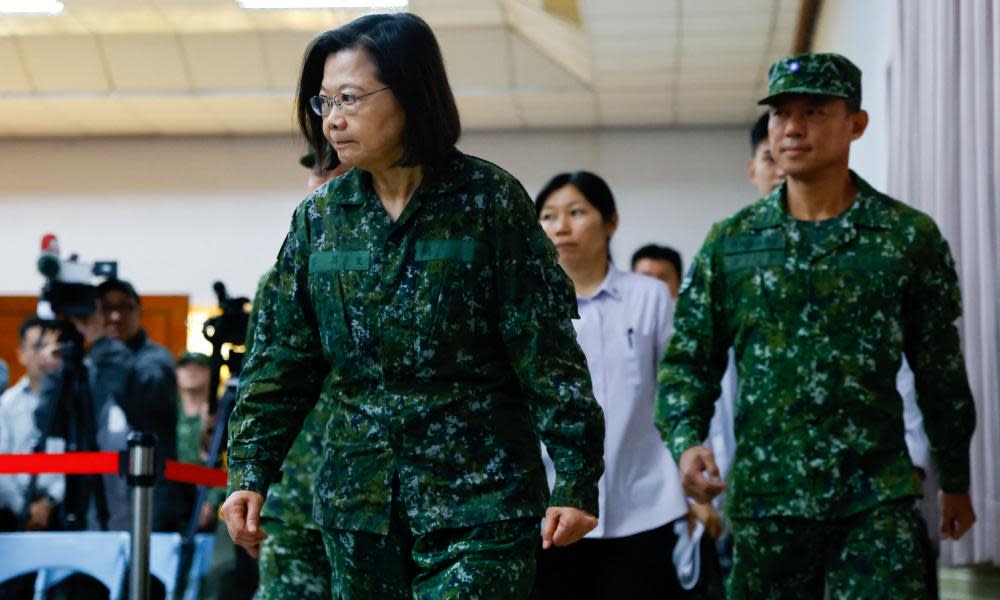Taiwan president says China has too many problems to invade

Taiwan’s president has said China is unlikely to attempt an invasion any time soon because it is “overwhelmed” by domestic problems.
Tsai Ing-wen made the remarks in an interview at the New York Times Dealbook Summit.
Beijing considers Taiwan to be a province of China, and has vowed to annex it under what it terms “reunification”. Xi has repeatedly said he hopes for a peaceful takeover, but has not ruled out the use of force. Taiwan’s government and population overwhelmingly reject the prospect of Chinese rule.
Asked about Xi’s hopes for a “peaceful” unification, Tsai on Wednesday said she believed the Chinese leadership was “overwhelmed by its internal challenges”.
“My thought is perhaps this is not a time for them to consider a major invasion of Taiwan … largely because of the economic, financial and political challenges, but also because the international community has made it loud and clear that war is not an option and that peace and stability serves everyone’s interest,” she said.
US intelligence services reportedly believe Xi has instructed China’s People’s Liberation Army to be capable of invasion by 2027, but there is no clear timeline for when such an act might occur. Predictions have ranged from 2023 to 2047 – the latter being the centenary of the People’s Republic of China.
In the meantime the PLA has ratcheted up aggressive military actions towards Taiwan, including daily incursions into its air defence identification zone, and regular live fire drills, often in response to acts that China’s Communist government deems provocative, such as Tsai meeting with US government figures.
Tsai said China was determined to interfere in Taiwan’s January presidential election, and sway it in China’s favour. She said this interference had occurred in some form in every election since 1996 when the first direct presidential elections were held after Taiwan came out of martial law.
“This includes the use of military stress and economic coercion, extensive cognitive warfare campaigns, both tradition and social media platforms, which are not unfamiliar to the people of Taiwan.”
She said the answer was to foster greater unity and trust among different social groups, and counter social discord.
“Taiwan is facing mounting military intimidation, greyzone campaigns, cyber-attacks and information manipulation,” Tsai said.
“In the face of that, Taiwanese people remain calm, and some commentators suggest we may be too calm. But the fact is Taiwanese people remain clear-eyed about the situation.”
Tsai will step down as president after the election in January, having served the maximum two terms. Her time as president saw worsening cross-strait tensions with China, as Xi Jinping ramped up military aggression towards Taiwan. Beijing cut ties with Tsai’s government upon her election, as it considers her Democratic Progressive party to be separatists.
Tsai’s presidency has also seen concerted efforts to bolster international ties and increase global support in deterring a Chinese invasion.
In the interview she was asked whether the shift of some semiconductor production to the US could weaken Taiwan’s value in the eyes of the global community in terms of protecting it from Chinese annexation. Taiwan manufactures the vast majority of the world’s most advanced chips, and the supply is crucial to technology around the world.
“We have more than semiconductors to be valuable,” she said, noting the wider “clusters” of sectors integrated in Taiwan’s chip production chain.
“We’re pretty confident that the capacity we have now, and the importance of our industry, cannot be replaced anywhere else.”

 Yahoo News
Yahoo News 
